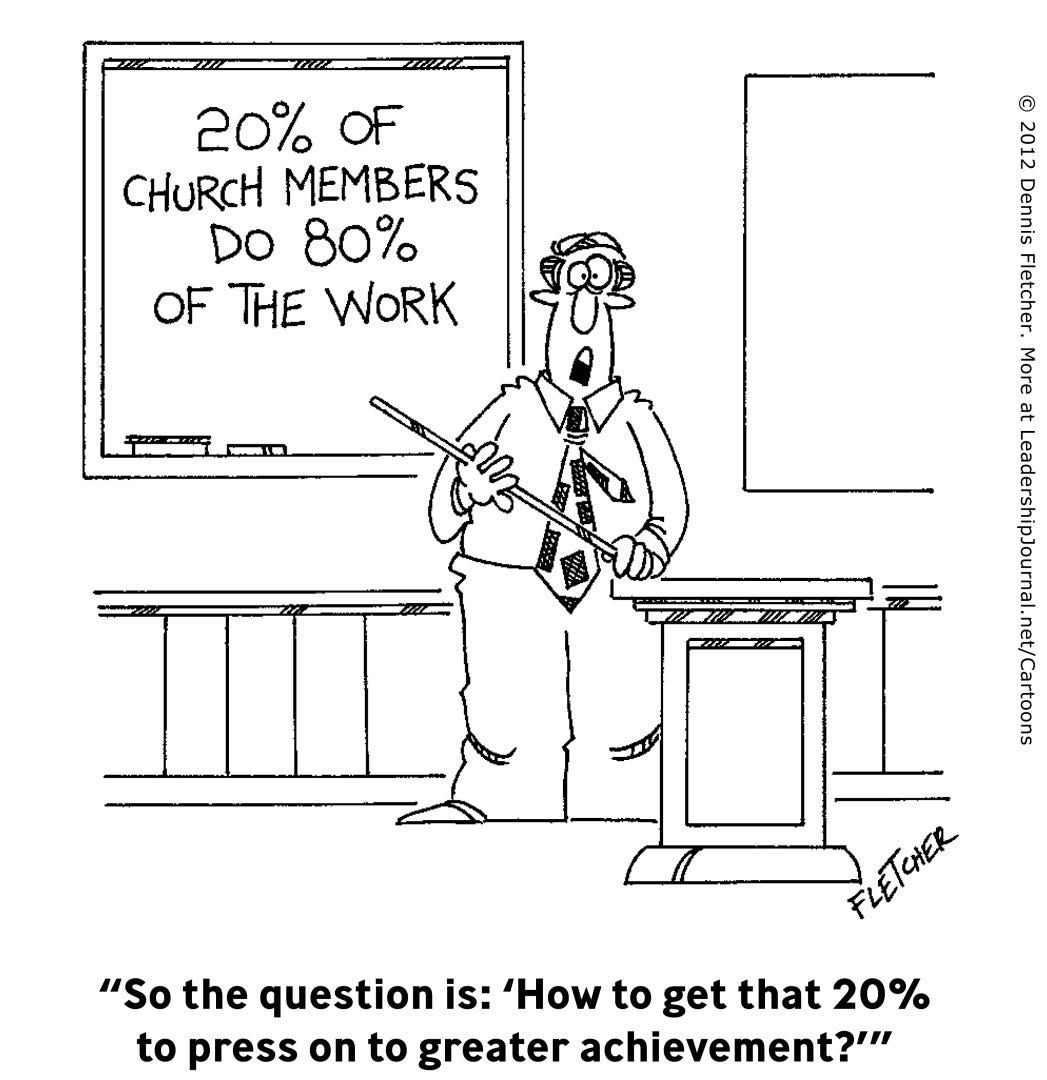For the Common Good
Positional hierarchy in the church, the 80/20 rule, and embodying the love of Jesus right where you are.
Now there are different gifts, but the same Spirit. There are different ministries, but the same Lord. And there are different activities, but the same God works all of them in each person. A manifestation of the Spirit is given to each person for the common good … One and the same Spirit is active in all these, distributing to each person as he wills.
1 Corinthians 12:4-7, 11, CSB
What comes to mind when you think of ministry? Perhaps it’s someone who works or volunteers for a church, or a government entity, or maybe it’s the 1980s metal band. For our purposes here, ministry will refer to doing the work of ministering — Christ’s intent to equip His people to build up His body, the church (Ephesians 4:12).
These days, ministry seems to have drifted from its primary focus of the common good and settled into a false state of positional hierarchy. If the goal is blessing for all, why are some ministry roles deemed more holy and important than others? One possible reason could be the tone in which Acts 6:1-7 is read. In this passage, the widows were being neglected in the frenzy of the early church’s booming growth. So the original Twelve disciples (- Judas + Matthias) got together with other followers of the Way to remedy the oversight.
The Twelve said, “It would not be right for us to neglect the ministry of the word of God in order to wait on tables. Brothers and sisters, choose seven men from among you who are known to be full of the Spirit and wisdom. We will turn this responsibility over to them and will give our attention to prayer and the ministry of the word” (NIV). Eugene Peterson’s interpretation is equally notable: “It wouldn’t be right for us to abandon our responsibilities for preaching and teaching the Word of God to help with the care of the poor. So, friends, choose seven men from among you whom everyone trusts, men full of the Holy Spirit and good sense, and we’ll assign them this task. Meanwhile, we’ll stick to our assigned tasks of prayer and speaking God’s Word” (MSG).1
The “Seven Chosen to Serve” occurrence is just an example of how the current ministry mindset could have been shaped. Words matter, and inflection informs understanding. If one type of ministry is believed to be the most important, only a fortunate few get to serve in the “crucial” areas of ministry while everyone else takes on the vital though less glamorous work behind the scenes. Wiping snot and changing diapers may not feel like holy service. And I’ve heard plenty of speculation about what preachers do all week in between Sunday sermons. But I’ll be the first one to say, both pastoring and cleaning up after humans is hard and dirty work. And both are necessary in God’s kingdom on earth.
Jesus placed great importance on widows and orphans, serving the least of these (Matthew 25:40), and how the last will be first and the first will be last (Matthew 20:1-16). Having walked with Jesus, the Twelve would have viewed all Holy Spirit assigned tasks as significant. Just as God’s Spirit gifted Bezalel and Oholiab in Exodus 31 with skills and craftsmanship to build the temple, the Spirit equipped the Twelve to preach and the seven men chosen to serve widows — all for the common good.
Today though, the body of Christ is heavily affected by polarization among ministries. Trying to get people to serve can feel like pulling teeth, so churches use different language to appeal to their flock.
Serve Our Church
Join the Team
Volunteer with Us
Ways to Minister to Your Community
Serving Opportunities
That last one is my favorite. The word opportunity makes it sound like a once-in-a-lifetime chance you don’t wanna miss out on. Like that time your grandma told you dusting the china cabinet is fun.
The slogans are meant to be persuasive, to stir that calling in the soul. And if that doesn’t work, well — some aren’t above using a little spiritual guilt-tripping. Think of what you could be doing for the kingdom. Both approaches tend to result in folks signing on the dotted line. Well, at least 20 percent of the congregation according to Vilfredo Paredo’s 80/20 Rule.
Wisdom literature says, “The diligent hand will rule, but laziness leads to forced labor” (Proverbs 12:24). As a former vocational ministry worker, I understand wanting to light a fire under the 80 percenters. The coffee runs out because only one person showed up. The worship set feels off because the musicians and A/V team are overworked. The toddler room can only take 3 kids due to volunteer shortages.
The fire needs to penetrate the heart more than the conscience, but appealing to moral standards works a lot faster, right? So ministry is often marketed as a duty, a defining individual choice — one that can assuage guilt or create worth. But for followers of the Way, the guilt has been paid, proving we have intrinsic value in the eyes of the One who matters most.
By using the abilities entrusted to us, we can minister to one another from the giftedness given by the Spirit of God. Whether that be holding babies, making coffee, preaching,2 leading corporate worship, being the person everyone knows they can count on, directing a Bible study, hosting people in your home, or something else completely. Each gift works together for the good of all.
And depending on the season of life, we may be assigned different skills. My past is riddled with various manifestations of the Spirit, like singing on a worship team, and working with kids and teens. I’m not currently engaged in those ministries, but back then I could not have imagined leading a Bible study or being a counselor. God equips us with what we need to bring about goodness when the time is right.
Ministry in and outside of the church building is simply using the gifts from God’s Spirit to embody the love of Jesus to one another. Maybe a change of perspective could begin to move the dial back toward the common good.
For those of you who were baptized into Christ have been clothed with Christ. There is no Jew or Greek, slave or free, male and female; since you are all one in Christ Jesus.
Galatians 3:27-28
The action of ministering encompasses the roles we participate in as part of a family. In Christ, we are quite literally blood related. Everybody plays a vital part. And that’s a whole other topic for next time.
The Fortnightly
A bi-weekly offering of music, good food, interesting reading, and a moment that needed capturing.
Tunes
I stumbled across Liz Vice last week. Her album, There’s A Light, has been true to its title this cold January. Vice’s blend of gospel-soul-R&B-funk summarizes my favorite genres into one captivating collection. I look forward to her third album coming this spring.
Menu
I’m craving Lebanese Taverna but they don’t deliver to Kansas so … taking advantage of an upper 30s day, we grilled this Chicken Souvlaki recipe from Mediterranean Living. Technically, chicken souvlaki originated in Greece, but Lebanese and Greek cuisine have many similarities. I serve the skewers alongside charred romaine hearts and French bread, then finish everything off with a mouth-watering Sweet Tahini Dressing. The souvlaki marinade only has 5 ingredients. I’ve let it marinate anywhere from 30 minutes to 3 hours and can attest it’s delicious no matter how much time you give it. You can skewer the chicken diced or in strips like an accordion fan. Both turn out sublime. Since I’m already mixing up the countries here, bon appétit!
Reading
Someone sent me this thought provoking article from Tabletalk Magazine which is an excerpt from Rosaria Butterfield’s book, Five Lies of Our Anti-Christian Age. The piece focuses on the differences between empathy and sympathy, exploring how empathy is not the right response in some scenarios and could actually be damaging. She writes,
Empathy’s intent is good—connecting with another person in pain. But when the person in pain needs to be rescued, empathy leads to alienation. This constant state of alienation reiterates the false idea that there is no real help available and that all we have is loneliness—the autonomous individual seeking meaning in his own pain.
… Jesus’s terms of sympathy means abandoning our own notions about how we need to be helped.
I appreciate where Butterfield is coming from, especially considering her past.* I’m also left wanting more conversation on the topic. I believe it takes discernment to know how best to respond as we follow the exhortation to “warn those who are idle, comfort the discouraged, help the weak, [and] be patient with everyone” (1 Thessalonians 5:14).
A friend I forwarded the article to observed: “I am empathic to murderers in the sense that I feel so sad for them, how lost and angry you must feel and be to get to the point and take a life. I don’t condone murder though. I guess I would like it better if [Butterfield] would approach the [topic] from passages like Jesus full of grace and truth, compassion for sheep without a shepherd, etc.”
If you read the article, what are your thoughts?
*For those unfamiliar with Rosaria Butterfield, she is a former tenured English professor at Syracuse University where she was instrumental in advancing LGBTQ+ rights alongside her lesbian partner. You can read about her 1999 conversion to Christianity in her biography.
Moment
A few years ago, my daughter Natalie and our friend Christina went for sushi. I noticed all three of us did something different with our straw paper so I lined them up, took a picture, and sent it the family chat with the caption: “Assign the straw paper.” I’ve kept up with the tradition since then, especially when I dine with someone new.
From my birthday lunch with Trina last week … can you guess which is mine?
Be well, friends.
Emphasis mine.
To be clear, preaching the gospel is extremely important and necessary (Romans 10:14-17), but there is more to making Christ known than speaking to a room full of people. For one, believers are called to pursue peace and holiness for the sake of knowing the Lord (Hebrews 12:14). Deeming one ministry as greater than another introduces opportunities for the flesh that Galatians warns against: idolatry, hatred, strife, jealousy, outbursts of anger, self-serving ambitions, divisions, cliques, envy, and things like these.









I appreciate your insights today. So much can be said regarding the hierarchy of “ministry” that has developed in the Church, but you have made a refreshing attempt at addressing it. Thank you.